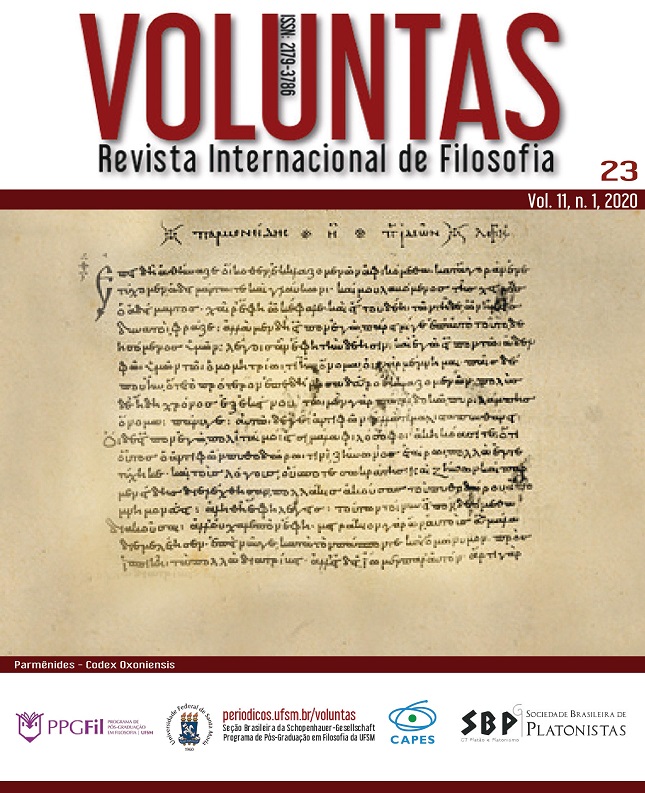The “Parmenides” as an aporetic dialogue
DOI:
https://doi.org/10.5902/2179378643307Keywords:
Plato, “Parmenides”, Aporia, “Third Man”, Predication, Self-predicationAbstract
This text aims at illuminating some of the roles played by the notion of “aporia” in Plato’s Parmenides. Having described some of its uses in Plato’s dialogues, it concentrates on the Parmenides, analyzing: 1. Socrates’ debate with Zeno; 2. The set of objections presented by Parmenides to Socrates’ use of “separation” and “participation”, focusing on the “Third Man Argument”; 3. Some paradoxical conclusions resulting from the eight “Hypotheses on the One”, in the second part of the dialogue. Our objective is to sustain the unity of the work arguing in favor of using “the results attained in its II part to solve the problems presented in the I”. Parmenides” exercise on the One and the Others proposes a reformulation of dialectics. It denounces the deficiency in Zeno’s practice of reducing to absurdity the consequences of the hypothesis “if there are many”. Instead it examines the consequences of “If there is One” relating the One to itself and to each of the Others; then the Others in relation to themselves and to whatever other thing, first asserting the hypothesis and then denying it.
Downloads
References
BEKKERUS, I. Aristoteles Graece: ex recognitione Immanuelis Bekkeri, Berolini, G. Reimer, 1831.
BROWN, L. The Sophist on Statements, Predication and Falsehood. In The Oxford Companion to Plato. G. FINE (ed.) Oxford University Press, 2014, pp. 437-462.
COHEN, M. The Logic of the Third Man. In PLATO 1. FINE, G. (ed.). Oxford: Oxford University Press, 1999, pp. 275-297.
CORNFORD, F. M. Plato and Parmenides. London: Routledge, 1939.
FREDE, M. Plato”s Sophist on False Statements. In The Cambridge Companion to Plato. R. KRAUT (ed.), Cambridge: Cambridge University Press, 1992, pp. 397-424.
FREDE, M. Prädikation und Existenzaussage. Göttingen: Vandenhoeck und Ruprecht, 1967.
GUTHRIE, W. A History of Greek Philosophy V. Cambridge: Cambridge University Press, 1978.
KAHN, C. Plato and the Post-Socratic Dialogue. New York: Cambridge University Press, 2014.
LEIGH, F. Two Modes of Being at Sophist 255c-e. Phronesis 57, 1, 2012, pp. 1-28.
MAIA JR., J. MURACHCO, H., SANTOS, J. T. Platão, O sofista. (Tradução; SANTOS, J. T., Introdução). Lisboa: Fundação Calouste Gulbenkian, 2011.
MEINWALD, C. Good-Bye to the Third Man. In: The Cambridge Companion to Plato. Cambridge: Cambridge University Press, 1992, pp. 365-396.
MEINWALD, C. Plato’s Parmenides. New York: Oxford University Press, 1991.
MORAVCSIK, J. Forms and Dialectic in the Second Part of the Parmenides. In: Language and Logos. Studies in Ancient Greek Philosophy. M. Schofield & M. Nussbaum (eds.). Cambridge: Cambridge University Press, 1982, pp. 135-153.
OWEN, G. Notes on Ryle’s Plato. In: PLATO 1. FINE, G. (ed.). Oxford: Oxford University Press, 1999, pp. 298-319.
PETERSON, S. The Parmenides. In: The Oxford Handbook of PLATO. FINE, G. (ed.). Oxford: Oxford University Press, 2011, pp. 383-410.
PLATONIS OPERA. Ed. I. Burnet. IV, Oxford: Oxford University Press, (1900, 1907).
RICKLESS, S. How Parmenides Saved the Theory of Forms. The Philosophical Review 107, n. 4, 1998, pp. 498-554.
RYLE, G. Logical Atomism in Plato’s Theaetetus. Phronesis 37, 1990, pp. 27-46
RYLE, G. Plato’s Parmenides. Mind 48, 1939, 1965, pp. 129-151, 302-325. Reprinted in Studies in Plato’s Metaphysics. R. E. Allen (ed.). London: Routledge and Kegan Paul , p. 97-147.
SANTOS, J. T. (2018). Metamorfoses do logos: do não-predicativo ao predicativo. Archai, 24, Sep.-Dec. 2018, pp. 179-206.
SANTOS, J. T. O postulado da infalibilidade nos diálogos platónicos. Classica 26, 2013, p. 131-144.
SANTOS, J. T. Introdução. In: MAIA JR., J., MURACHCO, H., SANTOS, J. T. Platão, O sofista. Lisboa: Fundação Calouste Gulbenkian, 2011, pp. 9-153.
SCHOFIELD, M. Likeness and Likenesses in the Parmenides. In Form and Argument in Late Plato. GILL, C., and McCABE, M M. (eds.). Oxford: Clarendon Press, 1996, pp. 49-77.
SCOLNICOV, S. Plato’s Parmenides. Berkeley, Los Angeles: University of California Press, London, 2003.
VLASTOS, G. Plato’s “Third Man” Argument (Parm. 132a1-b2): Text and Logic. Philosophical Quarterly, 19, 1969, pp. 289-291.
VLASTOS, G. The Third Man Argument in the Parmenides. Philosophical Review 63, 1954, p. 319-349.
Published
How to Cite
Issue
Section
License
The submission of original manuscripts to this journal implies the transference, by the authors, of the copyrights for printed and digital publication. The copyrights of a published manuscript belong ultimately to the author, and only the copyright for its first publication is reserved to the journal. Authors may only use the same results in other publications explicitly indicating this journal as the medium of the original publication.
Licence
Attribution-NonCommercial-ShareAlike 4.0 International (CC BY-NC-SA 4.0) - This license lets others remix, tweak, and build upon your work non-commercially, as long as they credit you and license their new creations under the identical terms.






